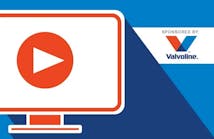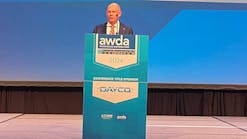Since Mark Freedman started full-time at Cooper-Lewis, Inc. in 1971, the Rhode Island-based PBE jobber has always prided itself on the company's tool and equipment business. A focus on being first-to-market with new products that can make its customers more profitable has helped Cooper-Lewis shape its identity, and set the tone in a fast-paced and competitive Providence market.
The company's attention to new and innovative tools and equipment actually dates back beyond 1971. Freedman's late father Murray joined Cooper-Lewis in 1948, and in 1957 he signed a contract with a frame equipment company, making Cooper-Lewis its first U.S. distributor.
In the mid-70s, MIG welders started becoming more common in body shops. Freedman says Cooper-Lewis quickly became the main U.S. distributor for a Canadian manufacturer of MIG welders, and soon added a few more MIG lines. "We did a heck of job with MIG welders for many years," he recalls. "If you walked into a shop up here and it had a MIG welder, there was a 50 percent chance it came from Cooper-Lewis. I was out doing demos every day, and even set up clinics at night to show shops how to MIG weld."
Freedman says Cooper-Lewis was also Johnny-on-the-spot when HVLP spray guns hit the scene. Later it was rotary screw compressors. "We're a distributor for Kaeser, and do nicely with their products," Freedman points out.
Not An Ordinary Approach
Founded in 1947, Cooper-Lewis operates two stores, in Providence, RI and Lynn, MA. Freedman runs the Providence location, which generates about 60 percent of the company's sales, while brother Brian runs the Lynn store. Roughly 85-90 percent of Cooper-Lewis' business comes from body shops.
Although paint generates the lion's share of sales at 70 percent, Freedman says tools and equipment continue to be a big part of what Cooper-Lewis is all about. For the second quarter of 2005, nearly 11 percent of this jobber's sales came from capital equipment. "Finding products that are somewhat out of the ordinary has been key to our success," states Freedman.
The latest example is swamp coolers. Freedman stumbled upon them at a trade show, and immediately saw an opportunity for Cooper-Lewis to once again provide its customers with a unique, productivity-enhancing product. "Cooling a shop is very expensive," Freedman points out. "But these swamp coolers do it pretty cost-effectively.
Several of our customers have purchased them, and after initially resisting, one of my bigger body shop customers bought a couple."
Freedman estimates that his sales reps have a 75 percent closing rate on the coolers, which have proven to be a great niche product, as well as something different to offer amongst body shop consumables and paint. As with all the tools and equipment Cooper-Lewis sells, a sales rep's success often comes down to how well he can educate the customer.
"We don't believe in shoving a product down our customers' throats," Freedman says. "We like to sell them innovative products that will help them become more profitable. Rather than saying, ‘Here's the next best thing on the block that you just gotta' have,' we like to go into shops saying, ‘Here's a product we really think you need because it will help you make more money … and here's how.'"
The benefits of customer education pay off in a number of ways. It not only helps Cooper-Lewis sell more tools and equipment, but it can also relieve some of the pressure shops put on the sales reps. "We tell shops not to worry about that 10 percent they want to beat us up on for paint and materials," Freedman relates. "Rather, shops should worry about reducing labor on a job by 10 percent, because that's some serious money in their pocket."
Looking forward, Freedman sees prep stations as the next labor-saving tool they want to take to the shops. Cooper-Lewis already does very well with spray booths, so prep stations are a natural fit. As with most of the equipment Cooper-Lewis has pioneered over the years, customer education will be vital if these prep stations are to catch fire like MIG welders and rotary screw compressors did in the past.
The challenge, Freedman says, is that the majority of body shops don't understand how a prep station can make them more productive—whether it's a full job prep station, or just a parts booth with a curtain around it. The main benefit of a prep station being that a shop doesn't have to tie up its paint booth for two hours in order to repair a couple of bumpers. So shop space and resources can be allocated more efficiently.
"You don't need the cleanest job in the world all the time, like when trimming parts," Freedman points out. "Let the paint booth do what it's supposed to do, and let these prep stations tackle the smaller jobs."
One of the challenges in selling prep stations is that many shops are hesitant to invest $20,000 for them, when, for example, their downdraft booth cost $50,000. Freedman says he "fought and fought" with one of his bigger shops to put in a prep station. "Now you can't get him out of there," he relates. "It's helped throughput in his paint department dramatically."
Another reason for Freedman to be excited about the potential of this product category is that Col-Met, a paint booth manufacturer Cooper-Lewis represents, is coming out with a lower-priced station.
Eroding Margins
On the other hand, he isn't too excited about the financial strains that continue to be placed on his business. He's been involved in PBE distribution a long time, though, and is well aware that success isn't served up on a silver platter. Times like this separate the best jobbers from the run of the mill.
"Margins have really slimmed down the past 15 years," Freedman explains. "But there are certain things a jobber can do to help the situation. For instance, nobody questions the cost of parts, so we're not hesitant to get a good margin. We also try to order smarter so we can minimize freight charges."
Supplier price increases have also been a problem, as Freedman says some chemicals see price hikes five or six times a year. "I'm paying more for lacquer-thinner than I sold it for last year," Freedman relates.
In response, Cooper-Lewis sales reps are working more closely with shops to better manage repair orders. This way shops can be fully compensated, either by insurance companies or consumers, for the materials they use. Sometimes Cooper-Lewis even provides the shop with a bill that breaks out all the materials used on a specific job. This helps the jobber pass along some of the price increases to its customers, without causing too much of a stir.
Velocity pricing is also a tactic Cooper-Lewis has utilized, though Freedman has never been a big proponent of it. The concept of velocity pricing says faster-moving inventory items yield a smaller margin. On the other hand, slower-moving SKUs can yield a better margin, since customers aren't as tuned-in to prices.
In the collision repair business, everyday items like sandpaper and solvent have become very price-sensitive. This is another reason why tools and equipment have been so important over the years. "If you have an item that's sitting on your shelf for a while, and a customer is willing to buy it, get the money you're entitled to," Freedman says. "In the case of a tool or equipment purchase, the shop has already decided that the product is a worthy investment. There's no need sell it at an outrageously discounted price. Use the opportunity to bolster your overall gross margin."
A solid gross margin is needed more than ever as the cost of doing business continues to climb. Vehicle expense has been a big one for Cooper-Lewis. Freedman says his company's gasoline costs have nearly doubled in the last year. "We've asked our customers if we can charge them 25 cents per delivery to help offset our rising costs," Freedman says. "They tell us that if we do, they'll find another jobber to do business with. Deliveries, costly as they may be, are part of the services we have to offer as a jobber. We just have to live with it."
Each morning Freedman gets together with the sales reps and delivery drivers to plan the most efficient route for that day. They have to be a lot more conscientious about going from A to B to C these days, since any wasted backtracking just adds to fuel costs.
Covering the Cape Cod market, which Cooper-Lewis has done for many years, is also more complicated these days. The farthest point is 110 miles away. To keep it cost-effective, Cooper-Lewis runs a truck down to the Cape a couple times a week, calling on body shops, industrial accounts and marine customers. Freedman says there used to be four jobbers in that market, but now there's only one. "We have a good opportunity to sell a lot of paint, supplies and tools," Freedman states. "The salesmen will hit 17-20 customers in a single run, taking about 15 orders." Even way down in Cape Cod, Cooper-Lewis has established strong relationships with its customers—relationships built mainly on trust and education.
Freedman is also an active member of the PBE Segment of the Automotive Aftermarket Industry Association (AAIA). "I'm lucky to have the chance to travel the country and see what's going on in the industry," Freedman says. "I see a lot of interesting things in the field, and bring those ideas back to our customers here in New England." Sometimes those ideas have involved tools and equipment that can help a shop become more productive and profitable.
With margins shrinking, costs rising and the collision repair environment becoming more competitive, Freedman says it's important to continue educating customers, and get them into systems that will help increase productivity. That's been a big part of what Cooper-Lewis has been all about, and it's what will continue to separate this PBE jobber from all the rest.
A Nice Place To Shop
For half a century, selling tools and equipment that make shops more profitable has been a big part of what's separated Cooper-Lewis from the competition. A lot of the sales success can be attributed to presentation—positioning products as labor-saving, profit-enhancing investments, instead of just "the next greatest thing."
Although walk-in business represents a minimal percentage of sales for Cooper-Lewis, this jobber has also worked hard to perfect its "at home" presentation. The Providence store showroom was remodeled a couple years ago. Mark Freedman enlisted the help of an interior decorator—his wife Caryl—to make the store more inviting to everyday customers, especially women, who seem to be frequenting the store on a much more consistent basis.
To this end, signage, merchandise and eye-catching photos of muscle cars hang neatly on walls. The clutter-free counter, recently painted a more soothing shade of green, is graced by plants and flowers. Computer monitors are placed beneath the countertop. Caryl says this creates a more inviting atmosphere for current and potential consumers.

